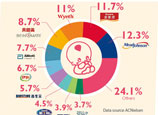
There is a Chinese saying that goes something like this: Back against the wall, and survive.
Many small and medium-sized enterprises in the private sector are finding themselves in that situation. They have been pushed against the proverbial wall by rising costs, dwindling overseas orders and the relentless appreciation of the yuan, which are sapping their competitiveness and eroding their profit margins.
Many of them are fighting back with ingenuity, wit and help from the government. The many thousands of private-sector SMEs are facing quite similar issues. To overcome the labor shortage problem, they need to invest in new machinery. But securing loans from banks at reasonable interest rates is, as some have said, like drawing blood from a stone.
A major objective of the government-initiated financial reform is to channel liquidity to the real economy, represented to a large extent by the many private-sector manufacturing enterprises of all sizes. But the process is slow and old banking habits die hard.
"Our problem is money," said Ye Shuhui, sales manager of Ningbo Jinfan Toy Co. China has plentiful capital. But much of that has gone into property and financial products.
The problems of the manufacturers are forcefully reflected in the nation's two purchasing managers' indices, which signal the health of the economy.
The PMI from HSBC, which tracks the performance of private-sector SMEs, contracted in May and June.
One from the National Bureau of Statistics, in which large companies have a heavy weighting, retreated to a nine-month low of 48.2 in June. A reading below 50 indicates a contraction of economic activities while one above shows expansion.
Of course, the government is concerned. The manufacturing sector contributes about 40 percent to China's annual GDP, with 60 percent of it coming from SMEs.
There are more than 10 million SMEs in China, accounting for 95 percent of all companies, yielding 50 percent of China's tax income and 80 percent of the job openings.
Premier Li Keqiang said at a State Council meeting in April that SMEs should be given a fair chance compared with State-owned enterprises. He also reiterated the importance of accelerating economic restructuring via structural tax cuts, which will do much to help SMEs.
To solve the financial problems of SMEs, the State Council released a series of advisory measures on financial support for economic restructuring and upgrading on July 5.
"The launch of the 10-point program will help SMEs solve the problems of a lack of loans, with lower costs and more capital made available by decreasing the reserve ratio of banks," said Zhou Dewen, chairman of the Wenzhou SME Development Association.
Fu Jiarong, manager of the Wenzhou Jiexin Small-Sum Loan Co, said the company used to offer certain temporary support to maintain the cash flow of SMEs. Now, it sees more borrowers coming in more frequently for short-term loans.
Fu added that most of the SMEs need more financial support to face the slowdown and upgrade, which would be solved in an improved financial environment with lower costs.



















![]()
